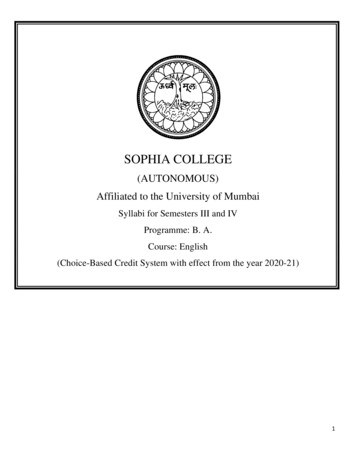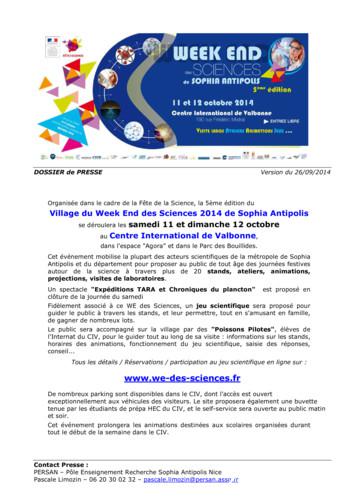SOPHIA COLLEGE
SOPHIA COLLEGE(AUTONOMOUS)Affiliated to the University of MumbaiSyllabi for Semesters III and IVProgramme: B. A.Course: English(Choice-Based Credit System with effect from the year 2020-21)1
UNIVERSITY OF MUMBAISOPHIA COLLEGE (AUTONOMOUS)SYLLABUS FOR S.Y.B.A. (ENGLISH)Paper II: HISTORY OF ENGLISH LITERATURE ISEMESTER IIICourse Title: History of English Literature I(FROM THE MEDIEVAL AGE TO THE RENAISSANCE)SEMESTER IVCourse Title: History of English Literature II(FROM THE ELIZABETHAN AGE TO THE CAROLINE PERIOD)Total no. of lectures per semester: 60No. of credits per semester: 32
Course: History of English Literature ISemester Three – History of English Literature I (From the Medieval Age to the Renaissance)Objectives: introduce students to medieval and renaissance literaturesfamiliarise them with the characteristic features of the major genres of the periodenable them to critically analyse other representative texts and art of the periodUnit I: Middle English Literature Socio-historical and cultural context: Literary trends:Norman conquest, Black Death, Wars of the Roses, scholasticism,translations and the construction of an English national identityallegory, legends, romance, balladUnit II: PoetryGeoffrey Chaucer:“General Prologue” to The Canterbury TalesORWilliam Langland:Piers PlowmanUnit III: Renaissance Literature Socio-historical and cultural context:Literary trends:Renaissance, reformation, humanismmystery, miracle and morality plays, sonnetUnit IV: Sonnets and Courtly Love PoetrySir Philip Sidney:Edmund Spenser:William Shakespeare:Aemilia Lanyer:Sonnet I of Astrophel and Stella (“Loving in Truth ”)Sonnet I of Amoretti (“Happy ye leaves .”)Sonnet 18 (“Shall I Compare Thee to a Summer’s Day?”)Sonnet 116 (“Let Me Not to the Marriage of True Minds”)Sonnet 130 (“My Mistress’ Eyes are Nothing Like the Sun”)“To the Lady Elizabeths Grace”3
Question paper patternSemester End Examination: 75 marksSemester III: History of English Literature I (From the Medieval Age to the Renaissance)Duration: 2.5 hoursQ.1 Essay on Unit 1 (1 out of 2)Q.2 Essay on Unit 2 (1 out of 2)Q.3 Essay on Unit 3 (1 out of 2)Q.4 Essay on Unit 4 (1 out of 2)Q.5. Short notes on all units (2 out of four)(15 marks)(15 marks)(15 marks)(15 marks)(15 marks)Internal Assessment: 25 marksStudents will be asked to submit assignments on the texts indicated below: Margery Kempe: The Book of Margery KempeMargaret Cavendish: The Blazing World4
Course Title: History of English Literature IISemester Four: History of English Literature II (From the Elizabethan Age to the CarolinePeriod)Objectives: introduce students to the literature of the Elizabethan, Jacobean and Caroline periodsfamiliarise them with the characteristic features of the major genres of the periodenable them to critically analyse other representative texts of the periodUnit I: Elizabethan Literature Socio-historical and cultural context:Literary trends:Spanish Armada, Globe theatre, the Elizabethan courtpastoral, Elizabethan drama (comedy and tragedy), travelogueUnit II: DramaA Midsummer Night’s DreamWilliam Shakespeare:ORWilliam Shakespeare:OthelloUnit III: Jacobean and Caroline Literatures Socio-historical and cultural context: Literary trends:the Authorised Version of the Bible, English Civil Wars, thedevelopment of science, the Cavaliersmasque, religious poetry, metaphysical poetryUnit IV: Metaphysical PoetryJohn Donne:George Herbert:Andrew Marvell:“The Canonization”“The Collar”“To His Coy Mistress”5
Question paper patternSemester End Examination: 75 marksSemester IV: History of English Literature II (From the Elizabethan Age to the Caroline Period)Duration: 2.5 hoursQ.1Q.2Q.3Q.4Q.5Essay on Unit 1 (1 out of 2)Essay on Unit 2 (1 out of 2)Essay on Unit 3 (1 out of 2)Essay on Unit 4 (1 out of 2)Short notes from all units (2 out of 4)(15 marks)(15 marks)(15 marks)(15 marks)(15 marks)Internal Assessment: 25 marksStudents will be asked to submit assignments on areas of their choice from the options indicated below: Renaissance visual artsa review of the adaptations of Shakespearean playsa comparative analysis of Elizabethan playsJacobean revenge tragedy6
Recommended readings:1.2.3.4.5.Alpers, Paul E. Elizabethan Poetry: Modern Essays in Criticism (OUP: 1967)Allen, Valerie. On Farting: Language and Laughter in the Middle Ages (Springer, 2010)Brooks, Cleanth. The Well Wrought Urn: Studies in the Structure of Poetry. Macmillan, 1970Daiches, David. A Critical History of English Literature (1960)Dollimore Jonathon and Alan Sinfield. Political Shakespeare: New Essays in Cultural Materialism. NewYork: Manchester University. 19926. Drakakis, John. Alternative Shakespeares. New York: Methuen. 20027. Eliot, T. S. “Tradition and Individual Talent”, Sacred Wood: Essays on Poetry and Criticism. Ingram, 20158. Ford, Boris. Medieval Literature: Chaucer and the Alliterative Tradition: with an Anthology of MedievalPoems and Drama9. Ford, Boris. The New Pelican Guide to English Literature, Vol. 1: The Age of Chaucer10. Ford, Boris. The New Pelican Guide to English Literature, Vol. 2, The Age of Shakespeare11. Ford, Boris. The New Pelican Guide to English Literature, Vol. 3: From Donne to Marvell12. Ford, Boris. The New Pelican Guide to English Literature: Medieval Literature13. Fulk, R D and Christopher M Cain. A History of Old English Literature, (Blackwell, 2003)14. Gardner, Helen. The Metaphysical Poets. Saland Publishing, 201115. Greenfield, Stanley B and Daniel G Calder. A New Critical History of Old English Literature. (NYU Press,1986)16. Heng, Geraldine. The Invention of Race in the European Middle Ages (CUP: 2018)17. Heng, Geraldine. Empire of Magic: Medieval Romance and the Politics of Cultural Fantasy (ColumbiaUniversity Press, 2003)18. Johnson, Samuel. Preface to Shakespeare, Createspace, 201419. Keast, William B. Seventeenth Century English Poetry: Modern Essays in Criticism (OUP:1971)20. King, Bruce. Seventeenth Century English Literature (Macmillan:1983).21. Krieger, Elliot. A Marxist Study of Shakespeare’s Comedies. New York: Barnes and Noble Books. 197922. Leggatt, Alexander. English Drama: Shakespeare to The Restoration 1590- 1660 (Longman: Literature inEnglish Series, 1988)23. Legouis, Emile and Louis Cazamian. A History of English literature in two volumes. J. M. Dent & Sons Ltd.London. 192624. Marlowe, Christopher. Doctor Faustus. Norton critical Editions, 200525. Morrison, Toni. Desdemona. Oberon books, 201226. Parry, Graham.The Seventeenth Century: The Intellectual and Cultural Context of English Literature. 16031700 (Longman: Literature in English Series, 1989)27. Perfitt, George. English Poetry of the Seventeenth Century (Longman: Literature in English Series,1992)28. Pooley, Roger. English Prose of the Seventeenth Century (Longman: Literature in English Series, 1992)29. Rackin, Phyllis. Shakespeare and Women. Oxford University Press. 201330. Ricks, Christopher. The Penguin History of English Literature Vol.3. (Penguin, 1993)31. Roston, Murray. Sixteenth Century English Literature (Macmillan, 1983)32. Shakespeare, William. A Midsummer Night’s Dream. Arden Shakespeare, 201733. Shakespeare, William. The Oxford Shakespeare: The Complete Sonnets and Poems (Oxford World'sClassics), 20107
34. Sinha, Samrita Sengupta. A Midsummer Night's Dream: Essays in Critical Appropriations (Essays inCritical Appropriation). Setu Books, 201435. Smith, Emma. The Cambridge Companion to English Renaissance Tragedy (Cambridge Companions toLiterature), 201036. Thompson, Ayanna. Shakespeare in the Theatre: Peter Sellars (Bloomsbury, 2018).Online Sources:1. “Mystery and Morality Plays”, British Literature Wiki, lity-plays/ Accessed 23 March 2020.2. “Shakespeare Resources: Online Resources” Morningside College HJF Learning e/online Accessed 3 Jan 20203. “Shakespeare’s stage” Internet Shakespeare Editions, age/Accessed 4 Feb 20204. “Shakespeare’s Theatre” Folger Shakespeare Library, d 3 Jan 20205. “TPM Special Series: Race, Racism and the Middle Ages” The Public racism-middle-ages-toc/ accessed 4 May 20206. “Women Writers” Internet Shakespeare ry/SLT/literature/women%20writers/women.html. Accessed 2April 20207. Dadabhoy, Ambereen. Early Modern Literature, Race, Religion, Politics, And Pop Culture, -shakespeare-at-harvey-mudd-college/ Accessed 23March 2020.8. John, B “Refugee Stories: Changing the Narrative” Refugee Tales, 2018, e-narrative/ Accessed 19 March 2020.9. Larson, John. “Effectively Reading Chaucer” Luminarium: Anthology of English arsonchaucer.htm Accessed 1 April 202010. Shakespeare’s Sources, http://www.shakespeare-online.com/sources/ Accessed 3 March 202011. Whitaker, Cord J “Race and Racism in the Man of Law’s Tale”, The Open Access Companion to theCanterbury Tales, https://opencanterburytales.dsl.lsu.edu/mlt1/ Accessed 15 Jan 202012. Wogan-Browne, Jocelyn. “The English Language Is, and Was, Profoundly Multicultural”, The PublicMedievalist, 2019, glish/ Accessed 20 Jan 2020.***8
SOPHIA COLLEGE(AUTONOMOUS)Affiliated to the University of MumbaiSyllabi for Semesters III and IVProgramme: B. A.Course: English(Choice-Based Credit System with effect from the year2020-21)9
UNIVERSITY OF MUMBAISOPHIA COLLEGE (AUTONOMOUS)SYLLABUS FOR S.Y.B.A. (ENGLISH)Paper III: INTRODUCTION TO LITERARY THEORY AND POPULARFICTIONSEMESTER IIICourse Title: INTRODUCTION TO LITERARY THEORYSEMESTER IVCourse Title: POPULAR FICTIONTotal No. of lectures per semester: 60No. of credits per year: 310
Course: Introduction to Literary TheorySemester Three: Introduction to Literary TheoryObjectives: to introduce students to the concepts of class, caste, race and genderto familiarise them to the ways in which these perspectives can be applied to literary textsto enable them to undertake such application independentlyUnit 1: Perspectives on Class1.Karl Marxand Friedrich Engels:Selections from The Communist Manifesto and Capital: ACritique of Political Economy2.Raymond Williams:Selections from Marxism and Literature3. A.O. Henry:“The Gift of the Magi”OR3. B.Anton Chekhov:4.Bong Joon-ho:“An Upheaval”ParasiteUnit 2: Perspectives on Caste1.Anupama Rao:“Caste, Gender and Indian Feminism” from Gender and Caste:Issues in Contemporary Indian Feminism:2.Sharmila Rege:“Dalit Women Talk Differently—A Critique of ‘Difference’Towards a Dalit Feminist Standpoint Position”and3. A.“The Poisoned Bread”Bandhumadhav:OR3. B.Mahasweta Devi:“Bayen”4.Meena Kandasamy:Selections from Ms Militancy: “One-Eyed”, “Once MySilence Held You Spellbound”11
Unit 3: Perspectives on Race1.Frantz Fanon:“The Black Man and Language” from Black Skin, White Masks2.Trinh T. Minh-ha:“Commitment from the Mirror-Writing Box” from Woman,Native, Other: Writing Postcoloniality and Feminism3. A.Alan Paton:Cry, the Beloved CountryOR3. B.Trinh T. Minh-ha:Forgetting Vietnam4.Wole Soyinka:“Telephone Conversation”Unit 4: Perspectives on Gender1.Chandra Talpade Mohanty:“‘Under Western Eyes’ Revisited: Feminist Solidaritythrough Anticapitalist Struggles”2.Ruth Vanita:“Thinking Beyond Gender In India”3. A.Elif Shafak:“A Migrating Bird”OR3. B.Vishwapriya L. Iyengar:“The Library Girl”4.Imtiaz Dharker:“Purdah I”, “Minority”12
Question paper pattern:Semester End Examination: 75 marksSemester III: Introduction to Literary TheoryDuration: 2.5 hoursQ.1Q.2Q.3Q.4Q.5Essay on Unit 1 (1 out of 2)Essay on Unit 2 (1 out of 2)Essay on Unit 3 (1 out of 2)Essay on Unit 4 (1 out of 2)Short notes from all units (2 out of 4)(15 marks)(15 marks)(15 marks)(15 marks)(15 marks)Internal Assessment: 25 marksStudents will be asked to submit assignments on any one of the following texts: Anubhav Sinha: Article 15Gina Prince-Bythewood: The Secret Life of BeesAlankrita Shrivastava: Lipstick Under My BurkhaChimamanda Ngozi Adichie: Americanah13
Recommended readings:1.2.3.4.5.Achebe, Chinua. Hopes and Impediments: Selected Essays. Penguin Books. 1990Baraka, Amiri. “I Will Not Resign!” Selected Plays and Prose of Amiri Baraka/LeRoi Jones. Morrow. 1979Barry, Peter. Beginning Theory (Fourth Edition). Viva Books. 2018Benhabib, Seyla and Judith Butler, Nancy Fraser. Feminist Contentions: A Philosophical ExchangeEstés, Clarissa Pinkola. Women Who Run with the Wolves: Myths and Stories of the Wild Woman Archetype.Ballentine Books. 20016. Gramsci, Antonio. Prison Notebooks. Vol. 1, 2 and 3. Columbia University Press. 20117. Marx, Karl. Engels, Frederick. Karl Marx, Frederick Engels: Collected Works. International Publishers.19858. Mohanty Talpade, Chandra. "Under Western Eyes: Feminist Scholarship and ColonialDiscourses." boundary 2, On Humanism and the University I: The Discourse of Humanism, Vol. 12, No. 3,Spring-Autumn, 1984, pp. 333-358.9. Moore, Robert and Douglas Gillette. King, Warrior, Magician, Lover: Rediscovering the Archetypes of theMature Masculine. Harper Collins. 199110. Nandy, Ashis: “An Anti-Secularist Manifesto”, Gandhi’s Significance for Today, ed. John Hick. PalgraveMacmillan. 198911. Nayar, Pramod. Literary Theory Today. Asia Book Club. 200212. Parkash, Anand. Marxism. Worldview Publications. 200213. Polyudova, Elena. Once Upon a Time in the Contemporary World. Cambridge Scholars Publishing, 201614. Qureshi, Hanif. The Buddha of Suburbia. Faber and Faber. 201714
Semester Four: Popular FictionObjectives: to introduce students to the history and the development of popular fictionto familiarise them with the different categories of popular fictionto enable them to undertake a thematic and semiotic analysis of popular fictionUnit 1: Science FictionHistory and developmentof the form:Selections from Adam Roberts’s The History of Science FictionIsaac Asimov:“First Law”OR“Bloodchild”Octavia Butler:OR“Love in a Hot Climate”Anil Menon:Unit 2: Detective FictionHistory and developmentof the form:Selections from The Cambridge Companion to Crime FictionSharadindu Bandyopadhyay: “Picture Imperfect”ORKenneth Branagh:Murder on the Orient ExpressORGillian Flynn:Gone GirlUnit 3: FantasyHistory and developmentof the form:Selections from The Cambridge Companion to Fantasy LiteratureLewis Carroll:Alice in WonderlandORNeil Gaiman:CoralineORUrsula Le Guin:“The Ones Who Walk Away from Omelas.”15
Unit 3: RomanceHistory and developmentof the form:Selections from Tania Modleski’s Loving With aVengeance: Mass-Produced Fantasies for WomenYou Can’t Fight A Royal AttractionRuchi Vasudeva:ORChetan Bhagat:2 States: The Story of My MarriageORAdam Shankman:A Walk to Remember16
Question paper pattern:Semester End Examination: (75 marks)Semester IV: Popular FictionDuration: 2.5 hoursQ.1Q.2Q.3Q.4Q.5Essay on Unit 1 (1 out of 2)Essay on Unit 2 (1 out of 2)Essay on Unit 3 (1 out of 2)Essay on Unit 4 (1 out of 2)Short notes on all units (2 out of 4)(15 marks)(15 marks)(15 marks)(15 marks)(15 marks)Internal Assessment (25 marks)Students will be asked to submit assignments analysing any one of the popular fictions from the following list.1.2.3.4.5.6.7.8.Vampire fictionFemale GothicFeluda storiesSelections from the works of Agatha ChristieChick-litHistorical fictionHarlequin RomancesSelections from Sir Arthur Conan Doyle’s Sherlock Holmes stories17
Recommended readings:1.2.3.4.Asimov, Isaac. Isaac Asimov: The Complete Stories, Vol.1.Broadway Books. 2001Butler, Octavia. E. Bloodchild and Other Stories. Seven Stories Press. 2003Cheyne, Ria. “Disability Studies Reads the Romance” (https://www.jstor.org/stable/j.ctv1xxs3r.14)Eco, Umberto. The Role of the Reader: Explorations in the Semiotics of Texts. Indiana University Press.19795. Guha, Sreejata. Picture Imperfect and other Byomkesh Bakshi Mysteries. Penguin. 20006. Humann, Heather Duerre. Gender Bending Detective Fiction: A Critical Analysis of Selected Works.McFarland and Company, Inc., Publishers. 20177. James, Edward and Farah Mendlesohn. The Cambridge Companion to Science Fiction. CambridgeUniversity Press. 20038. James, Edward. The Cambridge Companion to Fantasy Literature. Cambridge University Press. 20129. James, P.D. Talking About Detective Fiction. Vintage Books. 201110. Knight, Stephen. Crime Fiction since 1800: Detective, Death, Diversity. New York: Palgrave Macmillan.201011. Lavender, Isiah III. Black and Brown Planets: The Politics of Race in Science Fiction. University Press ofMississippi. 201412. Lothian, Alexis. Old Futures: Speculative Fiction and Queer Possibility. New York University Press. 201813. Modelski, Tania. Loving With a Vengeance: Mass Produced Fantasies for Women. Routledge. 199014. Mondal, Mimi and Alexandra Pierce. Luminescent Threads. Twelfth Books. 201715. Porter, Dennis. The Pursuit of Crime: Art and Ideology in Detective Fiction. New Haven, CT: YaleUniversity Press. 198116. Priestman, Martin. The Cambridge Companion to Crime Fiction. Cambridge University Press. 200317. Puri, Jyoti. “Reading Romance Novels in Postcolonial India” (https://www.jstor.org/stable/190481)18. Radway, Janice.A. Reading the Romance: Women, Patriarchy, and Popular Literature. The University ofNorth Carolina Press. 199119. Robert, Adams. The History of Science Fiction. Palgrave Histories of Literature. 200720. Scaggs, John. Crime Fiction (The New Critical Idiom). Routledge. 200521. Schalk, Sami. Body Minds Re/Imagined. Duke University Press. 201822. Stanley, Tarshia L. Approaches to Teaching the Works of Octavia E. Butler. MLA. 201923. Womack, Ytasha L. Afrofuturism: The World of Black Sci-Fi and Fantasy Culture. Chicago Review Press.201318
The New Pelican Guide to English Literature, Vol. 2, The Age of Shakespeare 11. Ford, Boris. The New Pelican Guide to English Literature, Vol. 3: From Donne to Marvell 12. Ford, Boris. The New Pelican Guide to English Literature: Medieval Literature 13. Fulk, R D and Christopher M Cain. A History of Old English Literature, (Blackwell, 2003) 14.
4 INAUGURATION Le village du WE des Sciences de Sophia Antipolis 2014 sera inauguré le Samedi 11 Octobre, à 17h00, en présence du Maire de Valbonne Sophia Antipolis, de représentants de PERSAN, de la CASA, du Conseil général des Alpes-Maritimes, du Conseil régional PACA, et de la DRRT.
sensor with 13.5 micron pixels and up to 8 MHz readout (2 x 4 MHz) e2v CCD230-42: 2048 x 2048 resolution sensor with 15 micron pixels and up to 16 MHz readout (4 x 4 MHz) SOPHIA 2048B - 132 27.6 mm 30.7 mm 27.6 mm 30.7 mm SOPHIA 2048B - 152 Reliable Performance Princeton Instruments has been designing high-performance scientific cameras for more
With SOPHIA’s auto-tuning capability, Redis is able to oper-ate through the entire range of workload sizes and read/write intensities, while the vanilla Redis fails with large work-loads. The main contributions of SOPHIA are: 1. We show that state-of-the-art static tuners when applied
Ambient Air Quality Parameters: A Case Study of Sophia Girls' College, Ajmer (India) 3 www.tjprc.org editor@tjprc.org 5. RESULTS AND DISCUSSIONS Air Quality Index of an organisation mainly depends on the location factor, whether it is situated in a rural area or urban area. If it is situated in the centre of a city that is near bus stand .
Daulat Ram College (W) Deen Dayal Upadhyaya College Delhi College of Arts and Commerce Department of Germanic and Romance Studies Deshbandhu College Dr. Bhim Rao Ambedkar College Dyal Singh College Dyal Singh College (Evening) Gargi College (W) Hans Raj College Hindu College Indraprastha College for Women (W) Institute of Home Economics (W .
Yes, sharing is the key to elf wealth,” said Sophia. 19. After lunch, they took us to their garden. “Liam is a bio-hacker, constantly experimenting with new plants like these grapes that keep us from getting sun burned,” explained Sophia. Liam continued, “When I develop a particularly
Sophia Mergiali-Sahas Page 2 Bibliography and Index. 2. Writing history with the Saints: from the society of the saints to the society of the Palaeologan era (1261-1453) (in Greek), Editions Herodotos, Athens 2014. ARTICLES 1. «Paul Lemerle (22 aνril 1908 - 17 juillet 1989)», Modern Greek Studies Yearbook 6 (1990) 427-42. 2.
The dark-eyed girl became unusually lively and pretty, and her presence cheered them. Of the two old maidens, the younger one--Sophia Ivanovna--was the kindlier, while the older one--Maria Ivanovna--was of austere disposition. Sophia Ivanovna kept the girl in decent clothes, taught her to read and intended to give her an education.





















